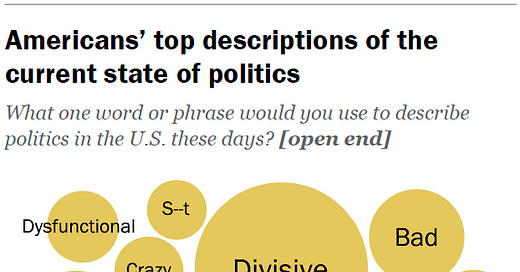Divisive, messy, corrupt, chaos
Plus: the problem with "select-all-that-apply," a look at Spanish-speakers, Democrats winning special elections, consultants using AI produced 40% higher quality results
No. 285 | September 22, 2023
📊 Polling & Public Opinion
Reem Nadeem: Americans’ Dismal Views of the Nation’s Politics (Pew Research Center)
“A comprehensive new Pew Research Center study of the state of the nation’s politics finds no single focal point for the public’s dissatisfaction. There is widespread criticism of the three branches of government, both political parties, as well as political leaders and candidates for office.
Notably, Americans’ unhappiness with politics comes at a time of historically high levels of voter turnout in national elections. The elections of 2018, 2020 and 2022 were three of the highest-turnout U.S. elections of their respective types in decades.
But voting in elections is very different from being satisfied with the state of politics – and the public is deeply dissatisfied.”
Keep reading with a 7-day free trial
Subscribe to The Intersection to keep reading this post and get 7 days of free access to the full post archives.




